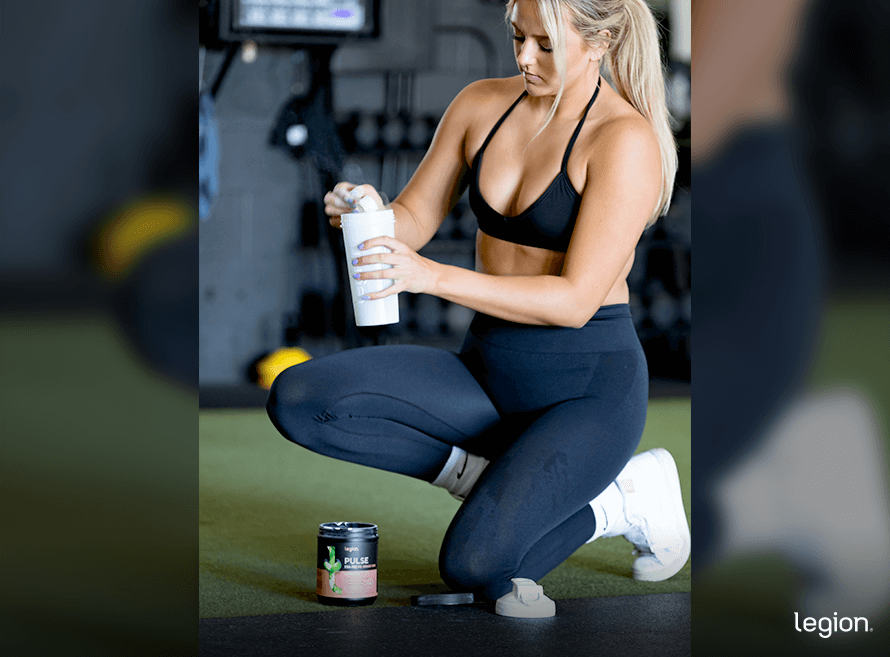
Learn from the person who can train without pre-workout or headphones.
That’s pretty solid training advice.
But if it sounds like lunacy, you might be leaning a little too hard on caffeine to get through your workouts—and that’s rarely a good thing.
Rely on stimulants for too long and they can cause a raft of unwanted side effects: jitters, anxiety, disrupted sleep, and erratic energy levels, to name a few. Worse still, they gradually lose their punch, so before long you need bumper doses just to drag yourself to the gym.
That’s where stim-free pre-workouts come in.
They offer many of the same performance benefits—better endurance, pumps, and power—without the side effects or dependency.
In this article, you’ll learn what non-stim pre-workouts are, how they work, what they typically contain, how they compare to regular formulas, how to use them to get the most out of your training, and more.
Key Takeaways
- A “non-stim” or “stim-free” pre-workout is a supplement designed to enhance performance without stimulants like caffeine.
- Instead, it improves workout “pumps,” endurance, power output, and recovery with ingredients such as citrulline malate, beta-alanine, and betaine.
- While stimulant-based pre-workouts boost alertness and focus by stimulating the central nervous system, stim-free formulas deliver many of the same performance benefits—without the jitters, crashes, or sleep disruption.
- Most ingredients in stim-free pre-workouts are well-studied and safe, but always look for products that are third-party tested to ensure purity, label accuracy, and the absence of banned substances.
- For a stim-free pre-workout containing proven ingredients in effective doses, no unnecessary junk, and that’s verified by independent lab testing, try stim-free Pulse.
Table of Contents
+
What Is Non-Stim Pre-Workout?
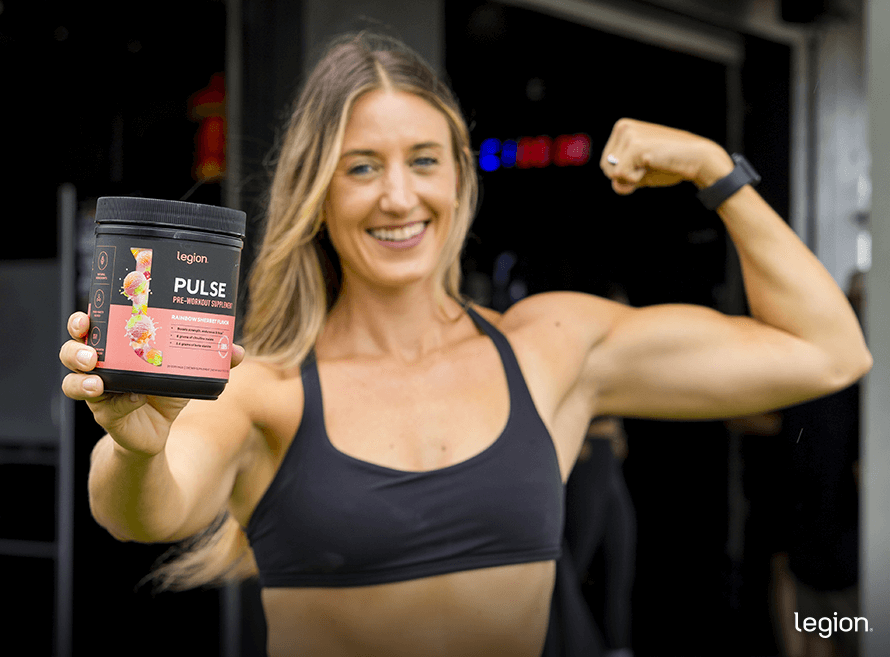
A “non-stim” or “stim-free” pre-workout is a supplement designed to enhance athletic performance without using stimulants like:
- Caffeine
- Yohimbine
- Theacrine
- Guarana
- DMAA (now banned)
The difference between stim and non-stim pre-workouts, then, is that stim formulas rely on compounds that increase alertness, energy, and focus by stimulating the central nervous system, while non-stim formulas use other ingredients to boost performance.
What Does Non-Stim Pre-Workout Do?
Despite containing no stimulants, non-stim pre-workouts enhance performance by:
- Improving your “pump,” which may benefit muscle growth
- Increasing endurance, allowing you to do more sets, reps, or both
- Reducing fatigue, helping you recover faster between sets and lift more weight with better form
- Boosting power output, which is useful for almost any sport
- Decreasing muscle soreness, which helps you have more productive workouts
So, while stim-free pre-workouts don’t deliver the same energy surge you get from stimulant-based formulas, they can still meaningfully improve your performance.
Common Non-Stim Pre-Workout Ingredients
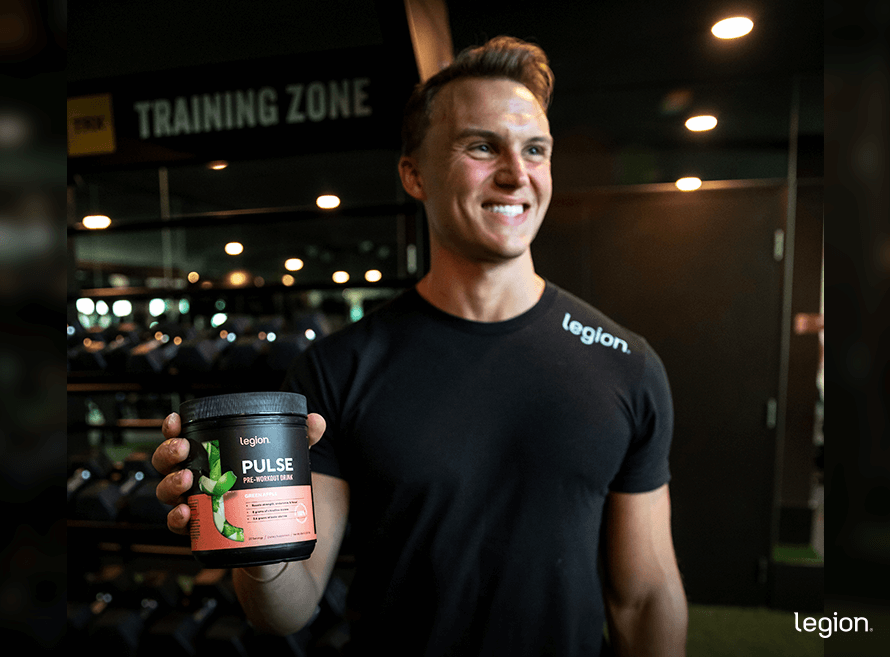
Here’s how the most common non-stim pre-workout ingredients work—and what science says about their effectiveness.
Citrulline Malate
Citrulline malate is a compound consisting of the amino acid L-citrulline and malic acid. The body converts L-citrulline into the amino acid L-arginine, which increases the production of nitric oxide—a gas that widens blood vessels and improves circulation.
(L-citrulline accomplishes this better than supplementing directly with L-arginine, which is very hit or miss in its effectiveness.)
Research shows that supplementing with citrulline malate improves muscle endurance, relieves muscle soreness, and boosts aerobic performance.
Beta-Alanine
Beta-alanine is an amino acid that increases the amount of work muscles can do before they fatigue, improves anaerobic exercise capacity, and increases muscle endurance.
A common side effect of beta-alanine is a mild prickling or itching of the skin called paresthesia, which usually occurs on the hands and face. If you experience this, don’t worry—it’s entirely harmless and often goes away over time (and just because it goes away doesn’t mean the supplement isn’t working!).
Betaine
Betaine (or trimethylglycine) functions both as a methyl donor and as an osmolyte.
Allow me to explain . . .
Betaine contains three methyl groups—small chemical units made up of one carbon and three hydrogen atoms—that can be transferred throughout the body to support essential processes like DNA synthesis, fat metabolism, and energy production.
It’s also an osmolyte, which means it helps balance fluid levels inside and outside cells, preventing them from shrinking or swelling too much.
These functions are especially important during physical stress, which is why supplementing with betaine boosts muscle endurance and increases strength.
Creatine
Creatine is a naturally occurring compound composed of the amino acids L-arginine, glycine, and methionine.
Creatine supplements are popular among gymgoers because they have numerous muscle-building and performance-enhancing benefits. Specifically, they boost strength and power, accelerate muscle growth, improve anaerobic endurance, enhance recovery, and more.
That said, there’s no advantage to taking creatine as part of your pre-workout. It doesn’t produce an immediate performance boost—it works by gradually “saturating” your muscles over time. For this reason, it’s perfectly fine if a stim-free pre-workout includes creatine, but it’s equally fine if it doesn’t.
BCAAs
Branched-chain amino acids (BCAAs) are three essential amino acids—leucine, isoleucine, and valine—that play key roles in muscle growth and energy production. Because of this, supplement companies often claim BCAAs can help you build muscle, train harder, and recover faster.
If you already eat enough protein, however, your body gets all the BCAAs it needs from food sources like meat, dairy, and eggs (or protein powders made from them).
In other words, taking BCAAs in addition to eating plenty of protein is like watering your lawn . . . after a storm.
The only time they may offer value is if you train fasted or struggle to meet your daily protein needs—which is better solved by simply eating more protein or using a complete protein supplement like whey or casein instead.
Alpha-GPC
Alpha-GPC (or alpha-glycerylphosphorylcholine) breaks down in the body into choline and glycerophosphate, two molecules naturally found in the brain that support its structure, function, and overall health.
Alpha-GPC also crosses the blood–brain barrier, where it boosts levels of acetylcholine—a neurotransmitter essential for memory, learning, and motor control.
While Alpha-GPC mitigates cognitive decline as we age, on the performance side of things, research shows it increases power output.
Vitamins and Minerals
Vitamins and minerals often appear in non-stim pre-workout formulations, but they’re mostly there for show.
They make the product look more “complete” or “healthy,” but they don’t immediately improve energy, strength, or endurance—especially if you already eat a balanced diet.
In other words, they’re filler ingredients that pad out the label rather than boost your performance.
Is Stim or Non-Stim Pre-Workout Better?
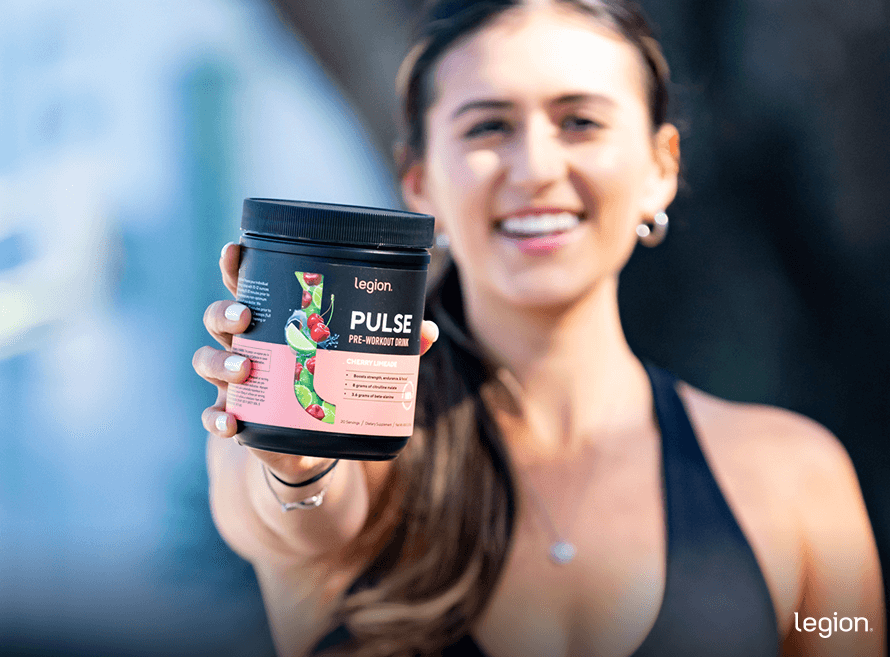
Many gymgoers think stim-free pre-workouts are pointless. In their opinion, the whole purpose of taking pre-workout is to feel amped up—and without stimulants, that doesn’t happen.
They’ve got a point.
Stimulants like caffeine enhance performance in almost every sport imaginable. That’s why they’re the backbone of most pre-workout formulas. By blocking fatigue and sharpening focus, they make hard training feel easier—and that’s hard to argue with.
But stimulants also have downsides. When used in large amounts or for long periods, they can cause jitters, anxiety, poor sleep, and uneven energy levels. Over time, they also become less effective as your body builds tolerance.
That’s where stim-free pre-workouts come in.
They offer many of the same performance benefits, without the side effects or dependency.
To see how they compare at a glance, here’s a quick side-by-side:
Stim vs. Non-Stim Pre-Workout
| Feature/Effect | Stim Pre-Workout | Non-Stim Pre-Workout |
|---|---|---|
| Immediate “energized” feeling | Yes | No |
| Improves endurance & performance | Yes | Yes |
| Enhances pump | Yes | Yes |
| Risk of jitters / anxiety | Yes | No |
| Potential sleep disruption | Yes | No |
| Builds tolerance over time | Yes | No |
| Good for late training sessions | No | Yes |
| Good during caffeine breaks | No | Yes |

And before you think, “I don’t get any side effects from caffeine,” research shows you probably do, even if you don’t notice them.
Benefits of Non-Stim Pre-Workout
Non-stim pre-workouts don’t give you a stimulant-fueled buzz, but they do offer several important advantages—especially if you care about recovery, sleep, and long-term performance.
No Energy Crash
Caffeine boosts performance by blocking adenosine, a neurotransmitter that promotes relaxation and sleep.
The catch is that your body keeps producing adenosine while caffeine is active, and once the caffeine wears off, that built-up adenosine floods your brain, leaving you sluggish and unfocused.
Stim-free pre-workouts skip the rush and the comedown, letting you train hard without the roller-coaster energy swings.
Easier to Cycle Caffeine
Caffeine’s benefits diminish the more you use it because your body becomes less sensitive to its effects (a tolerance that develops with most stimulants).
This puts you in a pretty wretched catch-22: the more you use caffeine, the less it works, and the less it works, the more you need to use.
To regain sensitivity, you need to take a short break from it. The trade-off is that you’ll likely experience some withdrawal symptoms, including reduced energy and performance, and you’ll also miss out on the benefits of the other ingredients in your pre-workout, like citrulline, beta-alanine, and betaine.
A stim-free pre-workout bridges that gap, keeping your workouts productive while your body restores its caffeine responsiveness.
Fewer Side Effects
High caffeine intake can cause jitters, nausea, anxiety, or a racing heart, especially in sensitive people or heavy users. Going stim-free eliminates those issues while still providing ingredients that enhance your workout performance.
No Impact on Sleep
Not getting adequate sleep can wreak havoc on your fitness goals. For instance, research shows that insufficient sleep slows down weight loss, increases muscle loss, and decreases performance.
Basically the polar opposite of what you want if your goal is to get fit.
The effects of caffeine typically last for 6–8 hours, so taking it for evening workouts often sabotages nighttime sleep.
You can avoid this issue by taking a stim-free pre-workout supplement. You’ll experience many of the same benefits as a regular pre-workout, but you won’t miss a wink of sleep when you go to bed.
More Flexibility with Caffeine
If you’re a devoted coffee drinker, regular pre-workout puts you on the horns of a dilemma: how do you enjoy your morning brew and your pre-workout without overdoing caffeine?
Most people solve it by skipping coffee on days they take pre-workout—but that’s hardly satisfying.
Stim-free pre-workouts offer a better solution. They let you keep your coffee ritual while still getting the performance benefits of a pre-workout—all without pushing your caffeine intake too high.
(And if you prefer tea, the same logic applies.)
Is Stim-Free Pre-Workout Safe?
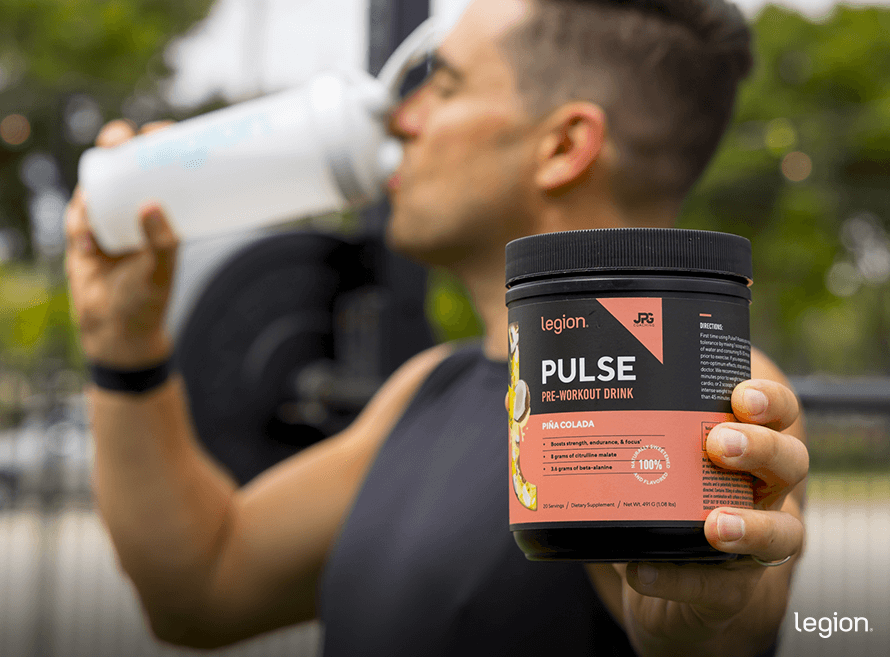
Most of the ingredients commonly found in stim-free formulas are well-studied and safe for healthy adults.
That said, a few ingredients can cause mild side effects. For example, beta-alanine makes your skin tingle, and citrulline or betaine can occasionally cause flushing or headaches in sensitive people. These effects are temporary and not a cause for concern.
If you’re taking medication or have a medical condition, it’s still smart to check with your doctor before using a stim-free pre-workout. Some pre-workout ingredients may interact with prescription drugs, particularly those affecting blood pressure or circulation.
The biggest safety concern isn’t the ingredients, however—it’s quality control.
Shady supplement companies frequently mislabel products or spike them with potentially harmful ingredients. And that’s why third-party testing matters.
To be absolutely sure a product is trustworthy, look for two things: a certification seal from a reputable lab verifying its purity and accuracy and public access to the test results.
That way, you know exactly what you’re putting in your body—and that it’s both safe and effective.
When Should You Use Non-Stim Pre-Workout?
Most people find stim-free pre-workouts most useful before evening training sessions, since they won’t disrupt your sleep the way a regular pre-workout might.
They’re also ideal when you’re taking a break from caffeine because they help you maintain your performance while your body resets its sensitivity.
If you prefer to limit caffeine rather than cut it entirely, you can also alternate between the type of pre-workout you use: take a stim-free pre-workout for most sessions, and save a stimulant-based one for your hardest workouts, like when you’re attempting a new one-rep max.
In any case, take a non-stim pre-workout 30 to 60 minutes before training, to give the ingredients time to kick in and enhance your performance.
What’s the Best Stim-Free Pre-Workout?
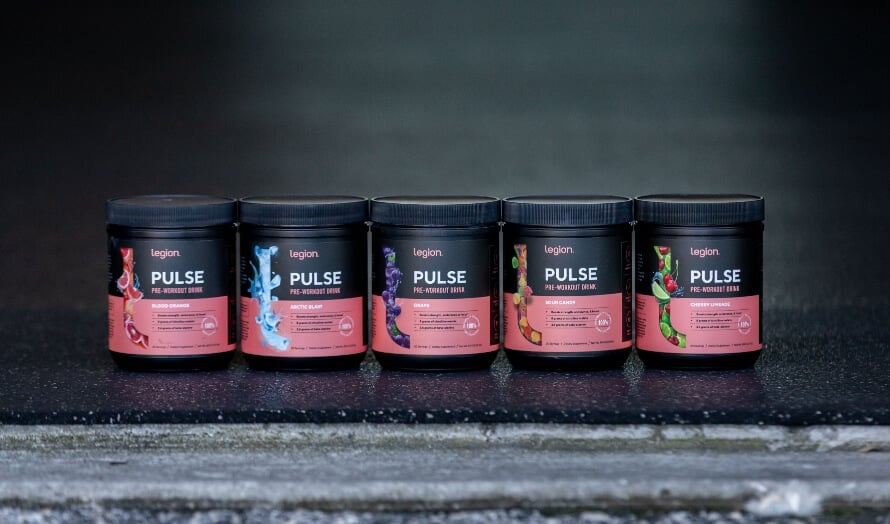
The best stim-free pre-workouts contain only proven ingredients in effective doses and are verified by independent labs to contain exactly what their label says.
And if you want a stim-free pre-workout that checks all these boxes, try stim-free Pulse.
Stim-free Pulse is naturally sweetened and flavored and contains clinically effective doses of four of the most researched-backed pre-workout ingredients: citrulline malate, beta-alanine, alpha-GPC, and betaine.
Stim-free Pulse also contains no added sugars, artificial sweeteners, flavors, dyes, fillers, or other unnecessary junk.
And unlike most supplements on the market, every batch of stim-free Pulse is lab-tested for purity and accuracy and independently certified by Labdoor™ to meet or exceed FDA and WADA safety guidelines.
(If you’re uncertain whether stim-free Pulse suits your needs and budget, take the Legion Supplement Finder Quiz to learn what supplements are right for you. Click here to check it out.)
The Bottom Line on the Best Stim-Free Pre-Workout Supplement
Stim-free pre-workouts are ideal if you want the performance benefits of a pre-workout without the caffeine-induced jitters, crashes, or sleep disruption.
They’re especially useful if you train later in the day or want to give your body a break from stimulants without losing momentum in your training.
Choose a formula that uses clinically effective doses of proven ingredients and is verified by third-party testing so you know exactly what you’re putting in your body.
FAQ #1: Do non-stim pre-workouts keep you awake?
No. In fact, that’s one of their main benefits. Because they don’t contain stimulants like caffeine, non-stim pre-workouts won’t disrupt your sleep—even if you take them late in the day—yet they still boost your performance in the gym.
If you train in the evening or struggle to fall asleep after using regular pre-workouts, going stim-free is an easy fix.
FAQ #2: Do non-stim pre-workouts make you tingle?
They might if they contain beta-alanine, an amino acid that boosts athletic performance but can also make your skin feel tingly or itchy for a short while after you take it. Importantly, the sensation is completely harmless and not a sign of an allergic reaction—it just means the ingredient is doing its job.
FAQ #3: Does non-stim pre-workout give you energy?
No—at least not like energy drinks or regular pre-workouts do.
You might feel like you have more energy after taking a stim-free pre-workout because it improves blood flow, helps your muscles work longer before fatiguing, and boosts power output—all of which help you train harder.
But it doesn’t make you feel “energized” the way caffeine or other stimulants do.
Want More Content Like This?
Check out these articles:
- Does Pre-Workout Make You Poop?
- Does Pre-Workout Cause Acne? What Science Says
- Is Honey and Salt the Perfect Pre-Workout Supplement?
Scientific References +
- Förstermann, Ulrich, and William C Sessa. “Nitric Oxide Synthases: Regulation and Function.” European Heart Journal, vol. 33, no. 7, 2012, pp. 829–37, 837a837d, https://doi.org/10.1093/eurheartj/ehr304.
- Zhao, Yingzi, et al. “Vascular Nitric Oxide: Beyond ENOS.” Journal of Pharmacological Sciences, vol. 129, no. 2, Oct. 2015, pp. 83–94, https://doi.org/10.1016/j.jphs.2015.09.002.
- Curis, Emmanuel, et al. “Citrulline and the Gut.” Current Opinion in Clinical Nutrition and Metabolic Care, vol. 10, no. 5, Sept. 2007, pp. 620–626, https://doi.org/10.1097/mco.0b013e32829fb38d.
- Pérez-Guisado, J., & Jakeman, P. M. (2010). Citrulline malate enhances athletic anaerobic performance and relieves muscle soreness. Journal of Strength and Conditioning Research, 24(5), 1215–1222. https://doi.org/10.1519/JSC.0b013e3181cb28e0
- Glenn, J. M., Gray, M., Wethington, L. N., Stone, M. S., Stewart, R. W., & Moyen, N. E. (2017). Acute citrulline malate supplementation improves upper- and lower-body submaximal weightlifting exercise performance in resistance-trained females. European Journal of Nutrition, 56(2), 775–784. https://doi.org/10.1007/s00394-015-1124-6
- Glenn, Jordan M., et al. “Acute Citrulline-Malate Supplementation Improves Maximal Strength and Anaerobic Power in Female, Masters Athletes Tennis Players.” European Journal of Sport Science, vol. 16, no. 8, 28 Mar. 2016, pp. 1095–1103, https://doi.org/10.1080/17461391.2016.1158321. Accessed 26 Aug. 2019.
- Bendahan, D., Mattei, J. P., Ghattas, B., Confort-Gouny, S., Le Guern, M. E., & Cozzone, P. J. (2002). Citrulline/malate promotes aerobic energy production in human exercising muscle. British Journal of Sports Medicine, 36(4), 282–289. https://doi.org/10.1136/bjsm.36.4.282
- Suzuki, T., Morita, M., Kobayashi, Y., & Kamimura, A. (2016). Oral L-citrulline supplementation enhances cycling time trial performance in healthy trained men: Double-blind randomized placebo-controlled 2-way crossover study. Journal of the International Society of Sports Nutrition, 13(1). https://doi.org/10.1186/s12970-016-0117-z
- Ament, Wim, and Gijsbertus J Verkerke. “Exercise and Fatigue.” Sports Medicine (Auckland, N.Z.), vol. 39, no. 5, 2009, pp. 389–422, www.ncbi.nlm.nih.gov/pubmed/19402743, https://doi.org/10.2165/00007256-200939050-00005.
- Hill, C. A., Harris, R. C., Kim, H. J., Harris, B. D., Sale, C., Boobis, L. H., Kim, C. K., & Wise, J. A. (2007). Influence of β-alanine supplementation on skeletal muscle carnosine concentrations and high intensity cycling capacity. Amino Acids, 32(2), 225–233. https://doi.org/10.1007/s00726-006-0364-4
- Sale, C., Saunders, B., Hudson, S., Wise, J. A., Harris, R. C., & Sunderland, C. D. (2011). Effect of β-alanine plus sodium bicarbonate on high-intensity cycling capacity. Medicine and Science in Sports and Exercise, 43(10), 1972–1978. https://doi.org/10.1249/MSS.0b013e3182188501
- Smith, A. E., Walter, A. A., Graef, J. L., Kendall, K. L., Moon, J. R., Lockwood, C. M., Fukuda, D. H., Beck, T. W., Cramer, J. T., & Stout, J. R. (2009). Effects of β-alanine supplementation and high-intensity interval training on endurance performance and body composition in men; a double-blind trial. Journal of the International Society of Sports Nutrition, 6. https://doi.org/10.1186/1550-2783-6-5
- Kern, B. D., & Robinson, T. L. (2011). Effects of β-alanine supplementation on performance and body composition in collegiate wrestlers and football players. Journal of Strength and Conditioning Research, 25(7), 1804–1815. https://doi.org/10.1519/JSC.0b013e3181e741cf
- Trepanowski, J. F., Farney, T. M., McCarthy, C. G., Schilling, B. K., Craig, S. A., & Bloomer, R. J. (2011). The effects of chronic betaine supplementation on exercise performance, skeletal muscle oxygen saturation, and associated biochemical parameters in resistance trained men. Journal of Strength and Conditioning Research, 25(12), 3461–3471. https://doi.org/10.1519/JSC.0b013e318217d48d
- Lee, E. C., Maresh, C. M., Kraemer, W. J., Yamamoto, L. M., Hatfield, D. L., Bailey, B. L., Armstrong, L. E., Volek, J. S., McDermott, B. P., & Craig, S. A. S. (2010). Ergogenic effects of betaine supplementation on strength and power performance. Journal of the International Society of Sports Nutrition, 7. https://doi.org/10.1186/1550-2783-7-27
- Cooper, Robert, et al. “Creatine Supplementation with Specific View to Exercise/Sports Performance: An Update.” Journal of the International Society of Sports Nutrition, vol. 9, no. 1, 20 July 2012, pp. 1–11, https://doi.org/10.1186/1550-2783-9-33.
- Volek, Jeff S., et al. “The Effects of Creatine Supplementation on Muscular Performance and Body Composition Responses to Short-Term Resistance Training Overreaching.” European Journal of Applied Physiology, vol. 91, no. 5-6, 1 May 2004, pp. 628–637, https://doi.org/10.1007/s00421-003-1031-z.
- Jd, Branch. “Effect of Creatine Supplementation on Body Composition and Performance: A Meta-Analysis.” International Journal of Sport Nutrition and Exercise Metabolism, 1 June 2003, pubmed.ncbi.nlm.nih.gov/12945830/.
- Eckerson, Joan M., et al. “Effect of Creatine Phosphate Supplementation on Anaerobic Working Capacity and Body Weight after Two and Six Days of Loading in Men and Women.” The Journal of Strength and Conditioning Research, vol. 19, no. 4, 2005, p. 756, https://doi.org/10.1519/r-16924.1.
- De Jesus Moreno Moreno, Maria. “Cognitive Improvement in Mild to Moderate Alzheimer’s Dementia after Treatment with the Acetylcholine Precursor Choline Alfoscerate: A Multicenter, Double-Blind, Randomized, Placebo-Controlled Trial.” Clinical Therapeutics, vol. 25, no. 1, 1 Jan. 2003, pp. 178–193, pubmed.ncbi.nlm.nih.gov/12637119/, https://doi.org/10.1016/s0149-2918(03)90023-3.
- Kerksick, Chad M. “Acute Alpha-Glycerylphosphorylcholine Supplementation Enhances Cognitive Performance in Healthy Men.” Nutrients, vol. 16, no. 23, 9 Dec. 2024, pp. 4240–4240, www.mdpi.com/2072-6643/16/23/4240, https://doi.org/10.3390/nu16234240.
- Ziegenfuss, T., Landis, J., & Hofheins, J. (2008). Acute supplementation with alpha-glycerylphosphorylcholine augments growth hormone response to, and peak force production during, resistance exercise. Journal of the International Society of Sports Nutrition, 5(S1), P15. https://doi.org/10.1186/1550-2783-5-s1-p15
- Harrington, R. “Effects of Branched Chain Amino Acids, L-Citrulline, and Alpha-Glycerylphosphorylcholine Supplementation on Exercise Performance in Trained Cyclists: A Randomized Crossover Trial.” Journal of the International Society of Sports Nutrition, vol. 20, no. 1, 25 May 2023, https://doi.org/10.1080/15502783.2023.2214112.
- Bellar, David, et al. “The Effect of 6 Days of Alpha Glycerylphosphorylcholine on Isometric Strength.” Journal of the International Society of Sports Nutrition, vol. 12, no. 42, 17 Nov. 2015, www.ncbi.nlm.nih.gov/pmc/articles/PMC4650143/, https://doi.org/10.1186/s12970-015-0103-x.
- Astrup, A., Toubro, S., Cannon, S., Hein, P., Breum, L., & Madsen, J. (1990). Caffeine: A double-blind, placebo-controlled study of its thermogenic, metabolic, and cardiovascular effects in healthy volunteers. American Journal of Clinical Nutrition, 51(5), 759–767. https://doi.org/10.1093/ajcn/51.5.759
- Warren, G. L., Park, N. D., Maresca, R. D., McKibans, K. I., & Millard-Stafford, M. L. (2010). Effect of caffeine ingestion on muscular strength and endurance: A meta-analysis. Medicine and Science in Sports and Exercise, 42(7), 1375–1387. https://doi.org/10.1249/MSS.0b013e3181cabbd8
- Dunwiddie, T. V., & Masino, S. A. (2001). The Role and Regulation of Adenosine in the Central Nervous System. Annual Review of Neuroscience, 24(1), 31–55. https://doi.org/10.1146/annurev.neuro.24.1.31
- Daly, J., & Shi, D. (1999). The role of adenosine receptors in the central action of caffeine. In Caffeine and Behavior (Vol. 7, Issue 2, pp. 201–213). CRC Press. https://doi.org/10.1201/9781439822470.ch1
- Ishak, Waguih William, et al. “Energy Drinks: Psychological Effects and Impact on Well-Being and Quality of Life—a Literature Review.” Innovations in Clinical Neuroscience, vol. 9, no. 1, 2012, p. 25, pmc.ncbi.nlm.nih.gov/articles/PMC3280075/.
- Fredholm, B. B. (1995). Adenosine, Adenosine Receptors and the Actions of Caffeine. Pharmacology & Toxicology, 76(2), 93–101. https://doi.org/10.1111/j.1600-0773.1995.tb00111.x
- Willson, C. (2018). The clinical toxicology of caffeine: A review and case study. In Toxicology Reports (Vol. 5, pp. 1140–1152). Elsevier Inc. https://doi.org/10.1016/j.toxrep.2018.11.002
- Klein, E., Zohar, J., Geraci, M. F., Murphy, D. L., & Uhde, T. W. (1991). Anxiogenic effects of m-CPP in patients with panic disorder: Comparison to caffeine’s anxiogenic effects. Biological Psychiatry, 30(10), 973–984. https://doi.org/10.1016/0006-3223(91)90119-7
- Nedeltcheva, A. V., Kilkus, J. M., Imperial, J., Schoeller, D. A., & Penev, P. D. (2010). Insufficient sleep undermines dietary efforts to reduce adiposity. Annals of Internal Medicine, 153(7), 435–441. https://doi.org/10.7326/0003-4819-153-7-201010050-00006
- Souissi, N., Souissi, M., Souissi, H., Chamari, K., Tabka, Z., Dogui, M., & Davenne, D. (2008). Effect of time of day and partial sleep deprivation on short-term, high-power output. Chronobiology International, 25(6), 1062–1076. https://doi.org/10.1080/07420520802551568
- Souissi, Nizar, et al. “Effects of Time-of-Day and Partial Sleep Deprivation on Short-Term Maximal Performances of Judo Competitors.” Journal of Strength and Conditioning Research, vol. 27, no. 9, Sept. 2013, pp. 2473–2480, https://doi.org/10.1519/jsc.0b013e31827f4792.










